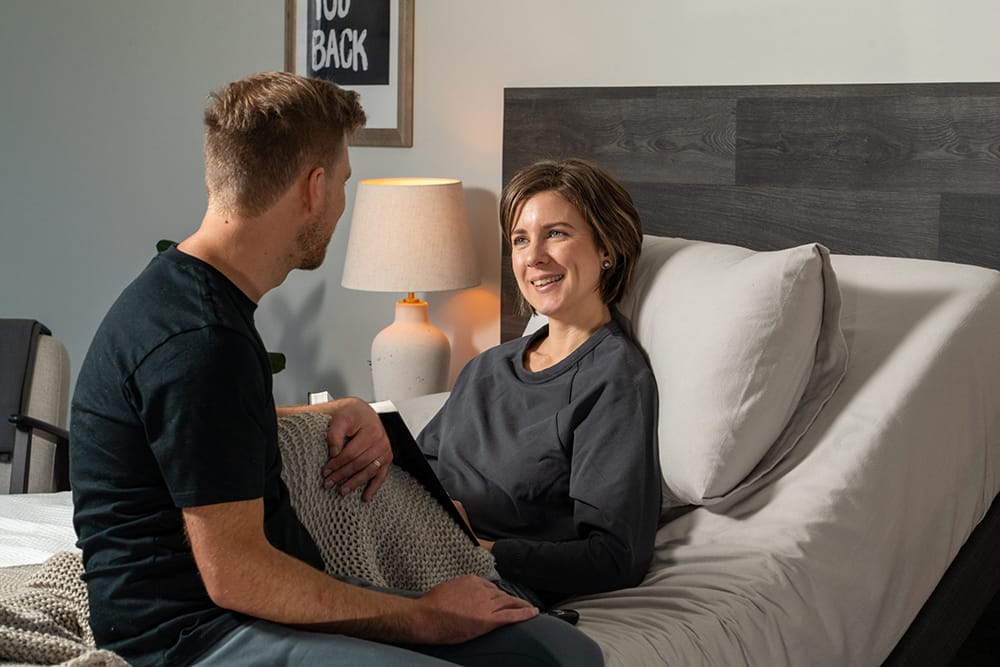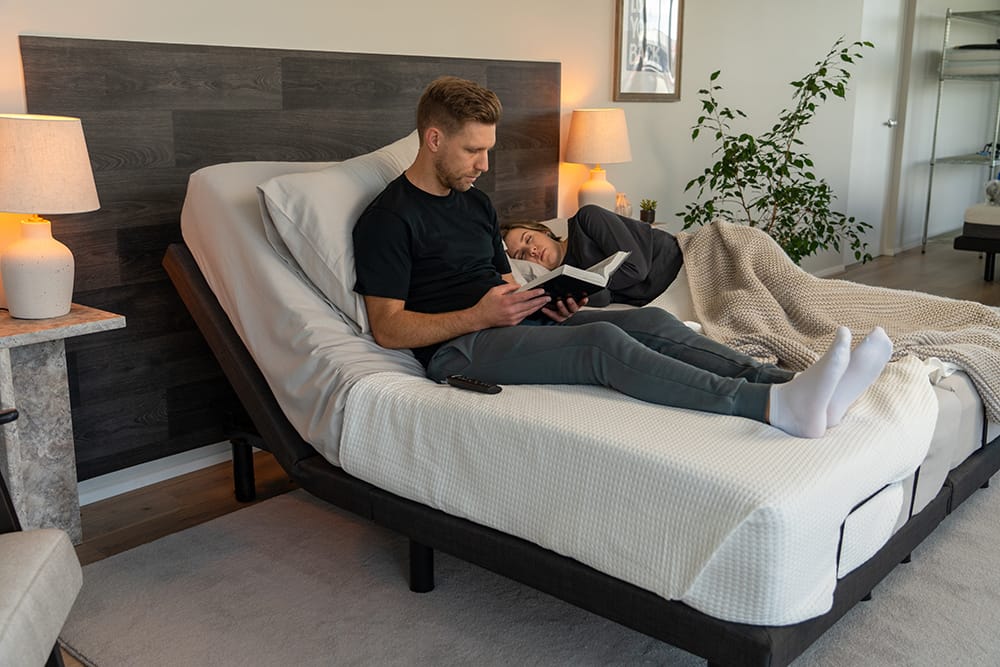
Sleep is one of the most important aspects of our lives, yet it is often overlooked and undervalued. Getting enough quality sleep is crucial for our physical and mental well-being. It not only allows our bodies to rest and recharge, but also helps us maintain a healthy immune system, improve cognitive function, and regulate our moods and emotions.
Unfortunately, many people struggle to get a good night’s sleep. With busy schedules, stress, and distractions from technology, it can be difficult to unwind and get the rest we need. However, with these top 8 sleeping tips, you can improve your sleep hygiene and wake up feeling refreshed and energised.
Understanding the Importance of Sleep

So many of us have just grown accustomed to waking up feeling tired and groggy, thinking it’s just a normal part of life. We tell ourselves we just need a coffee or a cold shower and we’ll be alright. But in reality, not getting enough quality sleep can seriously affect our overall health.
Chronic lack of sleep has been linked to an increased risk of obesity, diabetes, heart disease, and even depression. Sleeping is the time our body uses to repair and restore itself, and when we don’t get enough of it, our bodies can’t function at their best.
We all deserve to wake up feeling well-rested and ready to tackle the day. By prioritising our sleep and implementing these tips, we can improve our sleep quality and reap the benefits of a good night’s rest. So let’s get into our best sleeping tips!
Preparing for a Good Night’s Sleep
A good night’s sleep doesn’t just happen at 10 PM when we decide to go to bed. It’s a process that starts way before that, and there are several things we can do throughout the day to set ourselves up for success.
Stick to a Sleep Schedule
First is sticking to a consistent sleep schedule. Our bodies thrive on routine, and when we have a set bedtime and wake-up time, our body learns when it’s time to rest and when it’s time to be alert. This can help regulate our internal clock, making it easier for us to fall asleep at night and wake up in the morning. You’ll want to aim to get at least seven hours of sleep each night.
Even on weekends, it’s essential to stick to a similar sleep schedule to avoid throwing off our body’s natural rhythm. You’ll want to try to go to bed and wake up within the same 30-minute window every day.
Create a Restful Environment
Your sleeping environment is super important when it comes to getting a restful night’s sleep. The top 3 things to keep in mind are temperature, noise, and light.
- Temperature: The ideal room temperature for sleeping is between 60-67 degrees Fahrenheit (15-19 degrees Celsius). This range helps our bodies maintain a lower core body temperature, which is essential for falling asleep.
- Noise: Try to eliminate any disruptive noises in your bedroom. If you live in a noisy area or have trouble with external factors like traffic or loud neighbours, consider investing in earplugs or using a white noise machine.
- Light: Darkness signals to our bodies that it’s time to sleep, so creating a dark space in your bedroom is crucial. If any bright light seeps into your room, try using blackout curtains or an eye mask.
Put Away Electronics
I know it’s so easy to scroll away on our phones or binge-watch our favourite show on Netflix before bed, but these habits can significantly impact the quality of our sleep.
The blue light emitted from electronic devices can suppress the production of melatonin (the hormone that helps us fall asleep) and disrupt our body’s internal clock.
A great way to keep this in check is to set a technology curfew, ideally at least an hour before bedtime. Use this time to wind down by reading a book or listening to some calming music.
Developing Healthy Sleep Habits During the Day

It’s not all about those hours leading up to bedtime; what we do during the day can also impact our quality of nighttime sleep.
Reserve Your Bed for Sleep
In the “work from home” day and age, it’s easy to blur the lines between work and relaxation. Still, it’s important to create a clear separation between your bed and other activities, especially stimulating ones like working or scrolling through social media.
This will help train your brain to associate your bed with sleep, making it easier to fall asleep when you get into bed at night.
Exercise Regularly
One of the most effective ways to improve your nighttime sleep quality is through regular exercise. Physical activity can help reduce stress, anxiety, and depression—all of which are common causes of poor sleep.
This doesn’t have to be a 5-mile run or an hour-long intense workout. Even just 30 minutes of moderate exercise, like walking or yoga, can make a significant difference in your sleep patterns.
Limit Alcohol and Caffeine Consumption
We all know caffeine can affect our sleep, but did you know alcohol can too? While it may initially make you feel drowsy, alcohol can actually disrupt the quality of your sleep, making it difficult to reach REM sleep, which is the most restorative stage of sleep.
To maintain healthy sleep over time, limit your caffeine intake to earlier in the day and avoid alcohol close to bedtime for better sleep.
Manage Stress & Anxiety
We all know that feeling of tossing and turning when we have something on our mind. Stress and anxiety can greatly impact if we have a bad night’s sleep. Finding ways to relieve stress and manage anxiety isn’t always easy (or we would all be doing it), but it’s crucial if you’re having trouble sleeping.
Try something you haven’t done before, maybe attend a yoga class, or a breath workshop, or even find some time to journal before bed while listening to soothing music.
Understanding Sleep Disorders
Sleep disorders are very common and can greatly impact our overall health and well-being. From insomnia to sleep apnea, it’s important to understand what may be causing you to have trouble falling asleep so you can address them properly and get a better night’s sleep. Your mattress, pillows, and even room temperature can play a role in sleep disorders.
If you suspect you have a sleep disorder, it’s important to consult with a medical professional for proper diagnosis and treatment. You may need to take some sleep medicine or have some melatonin supplements to assist in having a healthy sleep.
How Letto Can Help with Sleep Disorders
Many people experience issues like back pain, acid reflux, or joint pain that disrupt their rest. Letto’s Pillows, Linen Sheets, and Mattresses have been designed with your sleep in mind.
With the use of advanced materials and technologies, our products are specifically designed to improve circulation in your legs and feet, relieve spinal pressure, and even help with snoring and sleep apnea.
Our pillows provide proper support for your head and neck, ensuring comfortable alignment throughout the night. Our sheets are made from soft and breathable fabrics that will keep you cool and comfortable, while our mattresses offer the perfect balance of support and comfort.
Other Factors Influencing Sleep Quality

Okay, you’re at the point where you’ve implemented all of the sleep tips above and you’re still having trouble sleeping. What else could be affecting your snooze time? There’s a big possibility it might be time for a new mattress!
The Mattress You’re Sleeping On
Your mattress could be a major factor in your sleep quality. A good mattress provides the right amount of support and comfort for your body, promoting better sleeping posture and reducing aches and pains that can disrupt sleep. If you’re waking up feeling sore or achy, it may be time to invest in a new mattress.
Deciding to get a new mattress isn’t something you do on a whim—it’s an investment. And deciding what aspects of a mattress are important to you can be overwhelming. Consider factors such as firmness, material type (memory foam, innerspring, etc.), and budget when making your decision.
Mattress Factors to Consider to Help You Get Better Sleep
Firmness
The level of firmness you need in a mattress depends on your sleeping position and personal preferences. Generally, side sleepers should opt for a softer mattress to cushion their shoulders and hips, while back sleepers may benefit from a firmer mattress for proper spinal alignment.
The Letto mattress offers ultimate customisation with a balance of medium-firm and medium-soft support, catering to whichever sleep position you prefer.
Material Type
Different mattress materials have different benefits, so it’s important to consider what will work best for your body. After years of innovation and research, we’ve found that Letto’s Italian design and eco-friendly materials provide the best balance of comfort and support for a restful night’s sleep.
Along with a depth of 25cm and cooling gel memory foam, you’ll have excellent body support and a cooler sleeping experience.
Health Benefits
Let’s be honest, not all mattresses are created equal. A good mattress can not only improve your quality of sleep but also have positive impacts on your overall health.
The Letto mattress has been designed to alleviate those struggling with sleep disorders such as chronic back pain, snoring, or sleep apnea with its customisable support features.
Raise the head and foot of your mattress to find the perfect angle for better breathing and support.
Final Thoughts on Sleeping Tips to Improve Your Sleep

The best way to get the sleep you need and deserve is by assessing your individual needs and tailoring your sleep environment to fit them. Evaluate how you feel each morning—refreshed, or still tired? Do you need extra support for your back, sleep medicine, or a cooler sleeping surface?
Use these sleeping tips to achieve better sleep quality, focus on creating a comfortable sleep environment, maintaining proper sleep hygiene, and choosing the right mattress. Head over to Letto to discover how our mattresses can help you get the best night’s rest.
